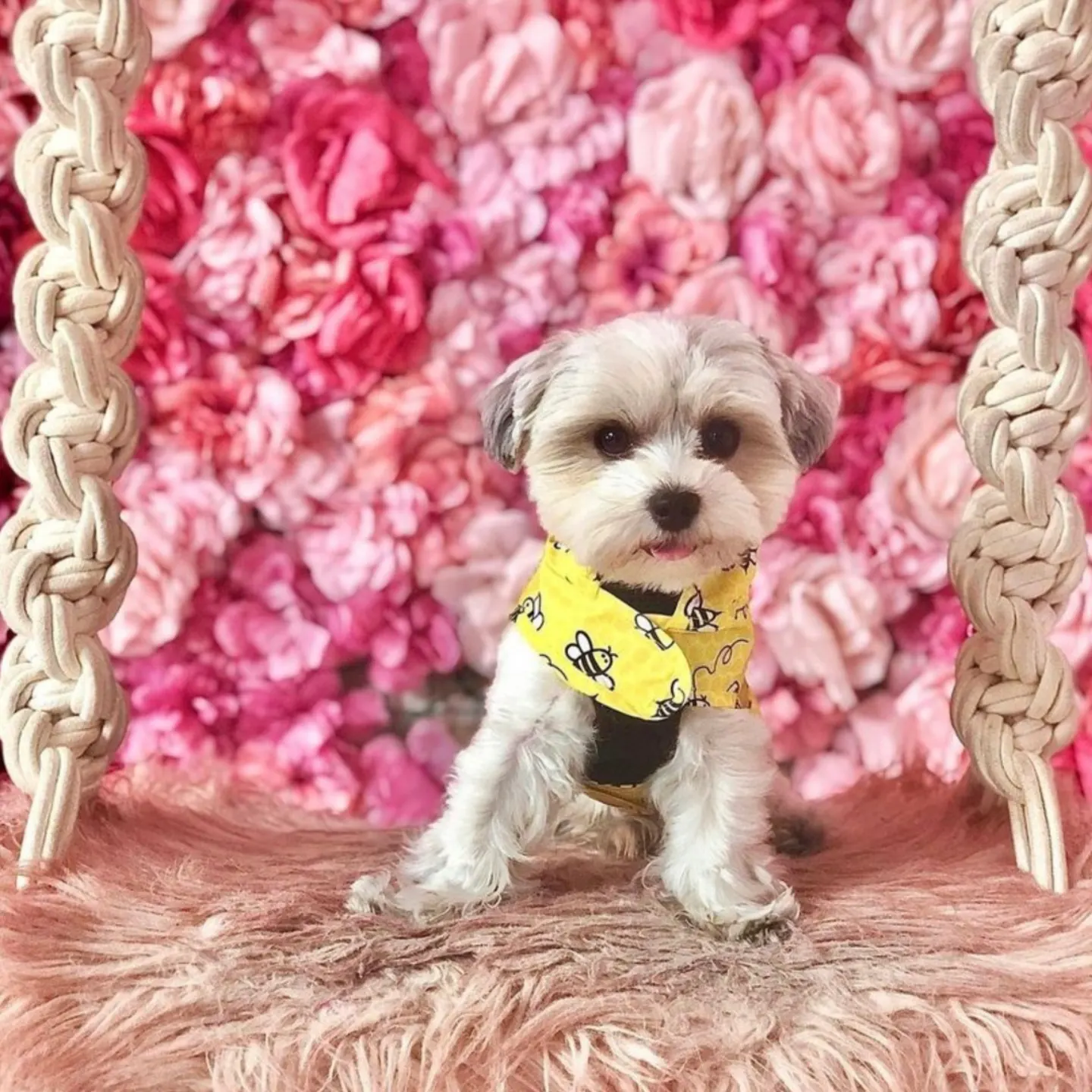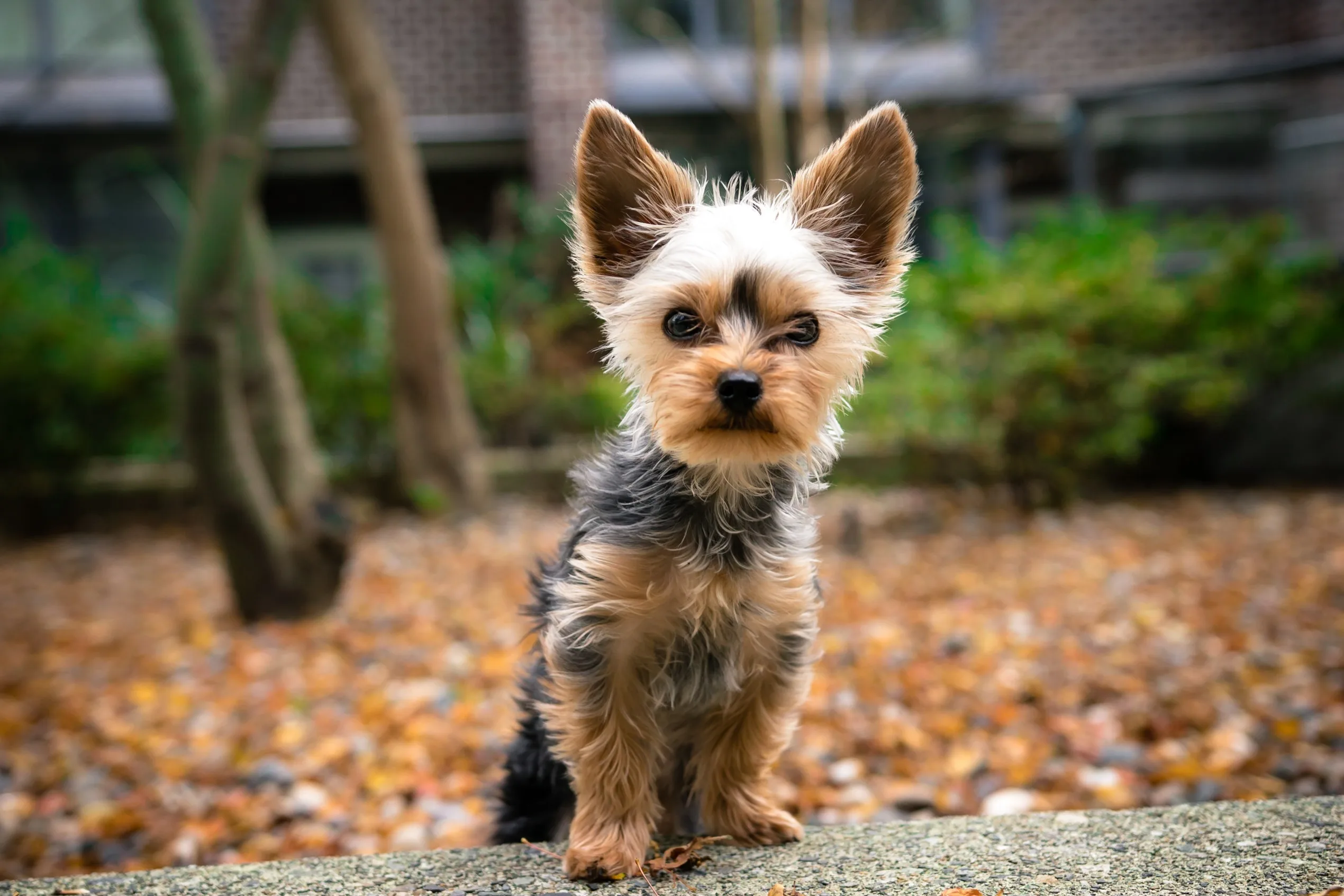If you are looking for a small family dog with a big personality then the Morkie is the right choice for you. Don’t be fooled by how small they are! The Maltese Yorkshire terrier mix is very active and has a big attitude. Even though they are small, Morkies are happy dogs that can play with toys for hours on end. Underneath its feisty and playful exterior, this small hybrid is a true lapdog that likes to cuddle with its people.
Being devoted lapdogs doesn’t stop Morkies from being vigilant watchdogs as well. They are small, so a thief, of course, won’t be scared off by them. Instead, their barking will let you know when someone is hiding near your house. Still, you might find that your dog is too watchful. Most Morkies bark when someone is at the front door or when birds are singing in the backyard.
Morkies are great pets for people who live in apartments because they are small and friendly. But they can bark a lot, which could bother your neighbors. Don’t forget that Morkies are small and fragile dogs, even though they are full of life and can play for hours on end. During play and rough handling, they can easily get hurt. This is why the Morkie is best for older kids and adults or homes without other bigger pets that can roughhouse this small hybrid while playing.
The tiny Morkie, which is also called the Yorktese or Morkshire terrier, has many of the best traits of its parent breeds. It also has a few unique traits of its own. Whether you already have a Morkie or are thinking about getting one, here is everything you need to know about this cute breed.
History of the Morkie
No one is sure when the first Morkshire Terrier came to the United States, but fans of these designer dogs guess that they have been around for at least 20 years. The idea was to create a small and adorable lap dog that doesn’t shed too much. But that only tells a small part of the story. To really understand where the Morkie puppies comes from, you need to know about the history of the parent breeds.
Weavers in Scotland in the mid-1800s used Scottish terriers to make Yorkshire terriers. Since they were small, they were perfect for hunting the many rodents that lived in textile factories. Luckily for all Yorkies, they didn’t stay in the working world for too long. England’s Kennel Club recognized Yorkshire terriers in 1886, and they quickly became popular as lapdogs. Soon, they were most often seen on the laps of English women.
Even though Yorkshire terriers have been around for a long time, Maltese dogs make Yorkies look like they are a new breed. Maltese dogs are a very old breed. They can be traced back to the Phoenicians, who lived in Malta and built empires that ruled the Mediterranean before Greece. And they were sitting on the laps of ladies of leisure even back then. They kept their royal status while the Greeks and Romans were in charge. After the Roman Empire fell, they became popular with Chinese breeders. They were then mixed with Chinese toy breeds and sent back to Europe.

Source: Instagram (@morkiecorner)
Morkie temperaments
Morkies are sweet, loving, and caring dogs that form strong bonds with their owners and want nothing more than to be by your side every minute of the day. But no matter how cute the Morkie’s looks, it can quickly become too dependent. They are prone to serious behavior problems like separation anxiety and destructive behavior. This can be avoided, though, if the dog is trained and socialized from a young age.
This mixed breed was made to be a loving lap dog. The Morkie loves to cuddle with you or keep you entertained while they play for hours inside. Morkies will also get along well with older kids who know how to take care of such a fragile puppy. Small children could easily hurt this little dog.
They can form strong bonds with their owners quickly, so don’t leave them alone for long periods of time. But just so you know, Morkies bark a lot. Most of the time, they bark to get attention because they get anxious when they are alone. Give your pet enough attention to keep the noise from becoming an opera.
Your Morkie is the perfect example of a fearless, confident, and assertive toy dog, so be ready for a little troublemaker. They can get into trouble with other dogs, especially those that are bigger than them. You’d be surprised at how well they stand their ground with other animals, people, and even their vet.
Caring for a Yorkie Maltese mix
As with any other dog, you should come up with a care routine for your Morkie that will keep them healthy and happy from the moment you bring them home. Keep up with your dog’s regular vet visits and make sure he or she is up-to-date on vaccinations so that any health problems can be caught early.
Just because these dogs are small, don’t assume that they won’t need any training or exercise. They aren’t a low-maintenance breed by any means. Make sure to keep the following things in mind when caring for your Morkie.
https://youtu.be/9zaI8Ha2Euw
Training a Morkie
Morkies are smart, but they are also stubborn, which can make training them hard for both the dog and its owner. Morkie dogs are smart enough to learn any trick or behavior you want to teach them, but how you train them will determine if they want to follow your instructions.
The best way to train a Morkie is to make sure that they are happy. Make it fun for them by giving them treats and lots of praise. Your Morkie will probably shut down and refuse to learn if you are mean to it, yell at it, or scold it.
It’s important to get them potty trained as soon as possible, because these tiny pups pee a lot. But there’s something else you need to teach your Morkie before anything else. Your Morkie’s love for you might be sweet and cute, but it can also cause a lot of trouble. Morkies often get separation anxiety. You can avoid this by teaching them to be alone at a young age. Start with short periods of time, like a few minutes, and work up to longer ones, like a few hours.
Exercise
Morkies aren’t very active dogs, so they don’t need a high amount of exercise to stay in shape. Their short legs don’t need much to get them going, so most dogs should be fine with a 30-minute daily walk.
Besides taking your small dog on brisk walks, you can keep him or her busy by playing games both inside and outside. Your dog will stay healthy, happy, and busy with games like fetch, tug-of-war, hide-and-seek, flyball, and anything else they like.
The Morkie is a smart dog, but if it doesn’t get enough mental stimulation, it can get bored and act out quickly. You’re in for a rude awakening if you think a dog that small can’t do much damage. Even though Morkies are small, they won’t let their size stop them from tearing up your sofa cushions or chewing on your shoes, bags, carpets, or anything else they find if they’re bored or nervous.
That’s why you have to make sure that your dog gets mental exercise, as well as physical exercise. Invest in interactive toys and puzzles for your dog if you don’t want to come home from work to a house in shambles and your dog in the middle of it.
Grooming a Morkie
The Morkie’s coat can be different colors, usually a mix of the colors and coats of its parents. Their beautiful coats can be any color between black, white, brown, and tan. This small hybrid has a single coat that is long, smooth, and soft. This designer dog doesn’t shed much, so it might be a good choice for people with allergies.
Because the Morkie has a long, silky coat, they need regular grooming. The more often they are groomed, the better their fluffy coat looks and the more comfortable they are. A professional groomer is the easiest way to take care of a Morkie’s coat. You can also do these things yourself to save money and spend more time with your pet.
Daily brushing will be a must for their long coat. At least once every two months, or more often if your dog tends to get dirty, give your dog a bath. Just don’t do it too often. Use a mild shampoo and conditioner on your dog that won’t hurt their coat, dry out their skin, or make them feel uncomfortable.
Since a Morkie’s fur can grow several inches long, you might want to cut it every 6 to 8 weeks. Keeping your dog’s fur short and trimmed will make brushing much easier and take less time.
As part of your dog’s grooming routine, check their ears once a week for dirt and waxy buildup and clean them if necessary. You should also brush your Morkie’s teeth every day, because their small jaws make them more likely to get tartar and have dog dental disease.

Source: Instagram (@oliviathetinymorkie)
Food and nutrition
You wouldn’t think this toy dog has a big appetite, would you? It can eat more than it should, so it’s very important to watch what it eats. Be strict with your Morkie’s meals and snacks to keep them from getting fat and getting heart problems or joint problems. You should also limit how many treats you give your dog while training.
Smaller dogs usually need 40 calories for every pound that they weigh. For the first six months, give your puppy four meals a day. As they grow, you can cut back to two meals a day. For the first 18 months, Maltese-Yorkshire Terrier mixes need 300 to 500 calories a day, while full-grown Maltese-Yorkshire Terrier mixes may only need 200 to 300 calories a day.
Ask the breeder what your Morkie puppy has been eating, and keep doing that. Because their stomachs are so sensitive, this breed doesn’t do well when their food changes.
Morkie medical concerns
Even though crossbreeds have hybrid vigor and are usually healthy, Morkies are still prone to the health problems of their purebred parents.
Morkie dogs are still at risk for any health problems that are common in their parent breeds. Yorkshire terriers can get eye disease and have their kneecaps pop out of place. Maltese have been known to have liver problems, heart problems, and encephalitis. Even though good breeders should look for these problems, it’s still something to keep an eye on.
The most common health concerns in this breed include:
Getting a Morkie puppy
The Morkie is a popular designer hybrid, so it shouldn’t be hard to find a breeder near you. When looking for a breeder, you should be ready to do some digging and research to make sure they are honest and trustworthy.
It’s important to note that as teacup Yorkshire terriers became more popular, some breeders used them to make teacup Morkies.
Most people think it’s cruel and inhumane to intentionally breed these smaller dogs with health problems since they already have a lot of problems with their health as it is. So, even if they look cute because of their tiny size, you should stay away from teacup Morkies. That way you don’t have to deal with their many health problems or help breed them in an unethical way.
For a healthy standard Morkie puppy, you can expect to pay anywhere from $1,500 to $3,700. The exact price depends on many things, like the breeder, litter size, supply and demand, pedigree and the quality of both parents, and coat color.
The Maltese Yorkie mix doesn’t often end up in rescue centers or shelters. You can always look for a Morkie puppy at a local shelter and give it a forever home if you do find one. You can also check with Maltese and Yorkie rescue groups to see if they have any Morkies available for adoption.
Conclusion: Is a Morkie the right dog for me?
In conclusion, this is a great dog for someone who is interested to adopt a small size canine with a big size personality. The Yorkie Maltese mixed breed dog doesn’t need much exercise, he’s a good student who responds to training, and he will give you unconditional love.
This small, mixed-breed dog loves people and is a real lapdog. They are sweet and affectionate, and all they want to do is spend time with you and stay by your side. Don’t get me wrong, but Morkies are very needy dogs that will want your attention and love almost all the time. Even though they are housetrained, if their needs aren’t met, these puppies will throw a fit and start peeing and pooping in the house.
Don’t leave your Morkie home alone for long periods of time if you don’t want these temper tantrums to happen. This playful dog is people-oriented, loving, and needy. He doesn’t like to be alone and needs constant company. This is not the right breed for someone who lives alone and works long hours. They do best in homes with one or more people to keep them company all day, like big families or those with older children.

